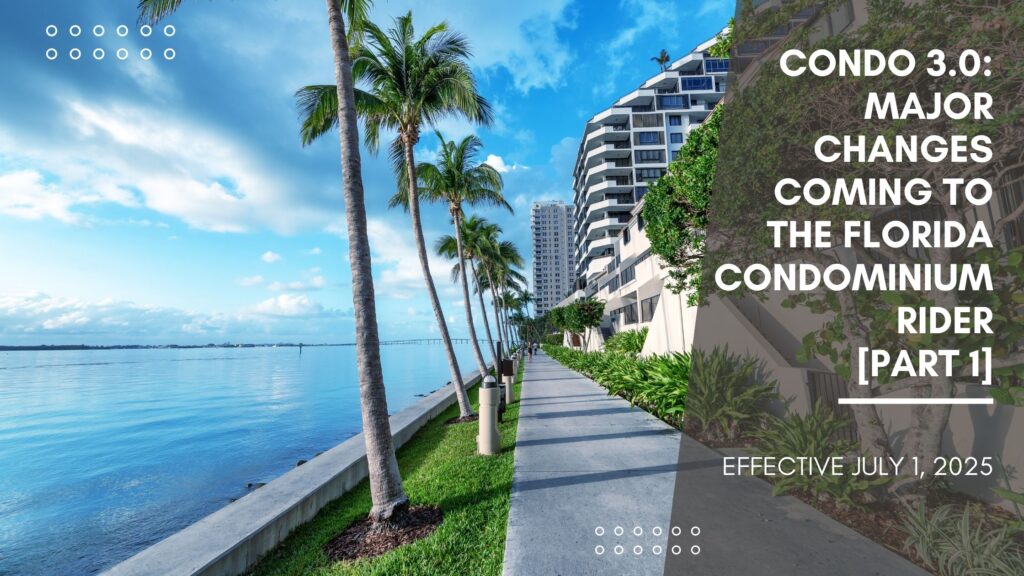New Condominium Rider Set to Debut on July 1, 2025
A significant update is on the way for condominium transactions, with a revised condominium rider scheduled to take effect on July 1, 2025. This latest version aims to address common grievances from past iterations, with every aspect of the rider undergoing meticulous revisions.
Key Changes and Enhancements
1. Homeowner’s Association Disclosure
One of the most notable additions is the new requirement for RIDER B: HOMESTEAD ASSOCIATION/COMMUNITY DISCLOSURE. This section ensures that if the property is part of a master homeowner’s association—or any homeowner’s association—the necessary information is provided upfront. Key details, including the association’s contact information, will now appear on the first page of this six-page rider. This revision aims to prevent buyers from encountering unforeseen issues post-purchase.
2. Condominium Association Approval
In the revised rider, it is explicitly stated that if a buyer does not receive approval from the condominium association within the designated timeframe, the contract will be terminated. This aligns with the termination language in the Homeowner’s Association/Community Disclosure section, providing clearer expectations for both buyers and sellers.
3. Right of First Refusal
The Right of First Refusal section has retained its core structure but with a critical amendment. The obligation for sellers to pay a “full commission” to brokers has been removed. Instead, compensation will now adhere to the agreements established between the involved parties.
- If the association exercises its right of first refusal, the contract will be terminated, and the buyer will receive a refund of their deposit.
4. Fees and Assessments
Assessments & Rents
Sellers will now have a clear mechanism to disclose any applicable fees, including rents for recreational areas, along with their payment frequency. This transparency is essential for buyers to understand ongoing costs associated with the property.
Fines & Violations
A noteworthy point includes the seller’s responsibility to resolve any ongoing violations related to the Condominium Association before the sale can proceed.
Special Assessments
The language around pending special assessments has been streamlined. The focus is now solely on levied assessments—those approved as per Florida law or the specific association’s governance documents.
- Sellers must disclose any assessed or discussed special assessments from the previous 12 months (see Florida condominium laws for more details).
- Payments will solely be the responsibility of the buyer or seller for any assessments that have been levied.
To accommodate these changes, there are now three distinct checkboxes in this section, allowing for greater clarity and decision-making regarding special assessments.
5. Sprinkler System Retrofit
This section remains mostly unchanged, ensuring that regulations regarding sprinkler systems in condominiums continue to be adhered to without alteration.
6. Nondeveloper Disclosure
A crucial update is found in the Nondeveloper Disclosure section. Buyers will now enjoy an extended period of seven days (increased from three) to review condominium documents specified in Part 5 of the rider.
- It’s made clear that even if buyers receive these documents prior to finalizing the contract, they must still have a minimum of seven days—including no weekends or holidays—before signing.
- If documents are not provided prior to signing, buyers can cancel the contract within seven days post-receipt, which could also extend the closing date, offering them added protection.
Conclusion
The revised condominium rider is a necessary step in enhancing transparency and fairness in real estate transactions. From clearer communication between sellers and associations to increased buyer protections regarding association fees and document review periods, these changes are designed to safeguard the interests of all parties involved.
By staying informed about these updates, potential buyers and sellers can navigate the condominium market with greater confidence and security. For further details, consider consulting resources from real estate associations and legal experts specializing in condominium laws.


